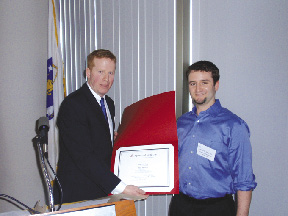The Mass. Chapter is off to a strong start in 2009 despite a weakening real estate market. The chapter's first program of the year, 2009 Economic Outlook and Real Estate Trends, was held on January 27th. The capacity crowd was given an extensive market overview by four of the region's leading professionals. The panelists, the topics they covered, and some of their comments were as follows:
Ronald Perry, Colliers Meredith and Grew - Boston and Suburban Office Markets: The market has changed with the scale being more weighted toward the tenant rather than the landlord. Rental rates are decreasing with softening demand as a result of layoffs, and a significant amount of sublease space is coming to the market. Tenants remain in the marketplace, but have put some decisions on hold or lessened space requirements.
Christopher Phaneuf, Eastdil Secured, LLC - Investment Sales Market: Sales volume decreased significantly through 2008 with U.S. sales of commercial investment properties reaching $30 million in the 4th quarter of 2008, as compared to $87.3 million in the 4th quarter of 2007; a 66% decline. There was also a tremendous shift in buyer composition over the same period, with foreign investors being the predominant buyer in 2008 as compared to funds in 2007. Both initial yields and target IRRs have increased 100 to 150 basis points in the past year, and smaller deals are favored over larger deals. Lenders do remain, but they are predominantly selected banks and life companies that are pursuing class A properties under $100 million in size.
William McLaughlin, Avalon Bay Communities - Multi-Family Market: The apartment market lagged the downturn, and during 2007 and most of 2008 the multi-family market functioned robustly due to positive job growth. However, things had changed by mid-November. Occupancy has slipped and the construction of new developments has ground to a halt. Concessions are now common for both new and existing tenants.
James Koury, Jones Lang LaSalle - Retail Market: The retail market has been hard hit. Properties hit the hardest are power and lifestyle centers and permitted land. Those properties fairing the best are dominant supermarket anchored properties in major metro markets. Capitalization rates will return to pre-2004 levels. Upward pressure on cap rates will come from tight credit markets, higher vacancy rates and weakening market rents. These symptoms will result in defaults and a problem in refinancing loans due between 2009 and 2013. These properties will come up for sale in 2010 to 2014. There are plenty of willing buyers waiting to take advantage of distressed opportunity, and eventually these buyers will have a positive effect on pricing.
In summary, all panelists acknowledged the slowing economy and real estate market. Common themes were a continued lack of readily available financing, a transition from a landlords' market to a tenants' market and very difficult year ahead.
David Cary, MAI, MRICS is the 2009 president of the Mass. Chapter of the Appraisal Institute, and managing director of Integra Realty Resources, Boston, Mass.










